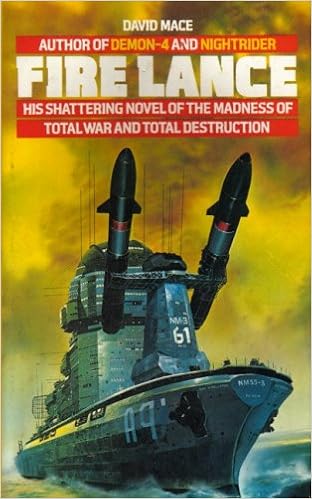We wannabe authors worry endlessly about the basics: how to write high-quality prose, getting enough words down (at least 110,000 for a novel), finding an agent and publisher.
Surely once these mountainous obstacles have been surpassed, our career will take off and we'll be the next Peter Hamilton or Iain M. Banks?
Let me introduce you to David Mace.
David Mace had a background not unlike Peter Hamilton's. He never engaged with a conventional career - he only wanted to write. Here is what he says about his start in life (writing in the 3rd person):
"David's only British educational distinction was to drop out of the same year of the same architecture course twice in succession. All he'd really ever wanted to be was a writer. In those days David read masses of stuff, mostly science fiction. The one that "did" it for him and set the rocky course of his life was Arthur C Clarke's CHILDHOOD'S END. He's since discovered how many sf readers had the same epiphany with the same book. It's something to do with the scope, scale, mysticism and tragedy. The revelation of sympathetic aliens was pretty important, too. (The xenophobic kill-it-cos-it's-different attitude wouldn't be for him…).Mace's 1984 book Demon-4 was science fiction of the dystopian kind. Demon-4 is a military submersible drone controlled by an onboard biological neural net, the shard of a human being. In SF, such shards often develop qualms - and Demon-4 is no exception.
The last thing that happened in Sheffield was DEMON-4, which David wrote just before leaving. After that it was an exciting new life in Freiburg, Germany. Seven wonderful years in the most beautiful place he's ever known - during which time he graduated from hamburger cook to mature student, obtaining an M.A. in linguistics."
In 1985 Nightrider was published. This described a duel between the advanced military spacecraft of the title and an enemy warship, circling a contested planet orbiting a dead star. It was a forensic analysis of deceit, duty and doom.
Then in 1986 Mace published his big one: Firelance. Here's a summary.
"‘Firelance’ (1986; 314 pp) is a near-future military SF novel that takes place nine weeks after a nuclear war between NATO and the Soviet Bloc. The resultant devastation - billions dead, cities little more than mounds of ashes - is compounded by the advent of ‘Nuclear Winter’, with essentially the entire surface of the earth gripped by perpetual darkness, freezing temperatures, strong gales, and snow.Firelance is a huge favourite of mine and many others: it looked like Mace's career as a leading SF writer was assured. Here's what happened next.
"Nonetheless, elements in what remains of the US government are determined to continue the conflict and to do so, the ultra-modern battleship ‘Vindicator’ is dispatched to cross the Atlantic and loose volleys of nuclear-tipped cruise missiles onto the Soviet mainland.
"The Vindicator is a 56,000 ton ‘Nemesis’ class ship, with advanced electronics gear for navigation, self-defense, and missile targeting; it comes with a complement of F-28 ‘Skycat’ VTOL fighters to repel enemy air attacks. In short, it’s the ideal ‘Doomsday’ weapons platform and needless to say, whatever remains of the Soviet armed forces are intent on sinking it before it reaches the cruise missile launch point in the North Atlantic.
"The main plot line follows the Vindicator as it sets off on its mission and faces threats from Russian submarines, aircraft, and anti-ship missiles, with at-sea operations hampered by the abysmal weather and the knowledge that there are few, if any, allied forces left to offer assistance. ... The narrative shifts from one character to another as a plot device to inform the reader on various aspects of naval combat, post-apocalyptic political manoeuvring the meteorology of nuclear winter, and the moral and ethical implications of committing what is essentially racial suicide."
"Early in the 1990s there was a sharp and very nasty recession. Publishing was hit. Hodder and Stoughton, David's publisher, fell into predatory hands. Like all the other mainstream houses, they shed authors in panic. David lost two commissioning editors in rapid succession, and his agent also went into stasis. His next agent started very well, but became seriously ill. Trying to find another, it was too late. Mainstream British publishing had been bought by the big corporations and had changed. He'd been missing for almost two years, and they told him he had no track record. Seven published novels no longer counted. And the agencies? All he got was offers to take ten percent of the contract after he'd secured it unaided. Apparently agents no longer read manuscripts or promoted authors. Everything had changed."He managed to establish himself as a translator. Turned out he was quite good at it. Trouble was, translation wasn't what he wanted to do."
So what is David Mace doing today? It's not clear: his website shows little after 2006 - he could be doing anything.
It's a hard old trade, being a writer.

I am trying to find a way to get in touch with Mr. Mace to express appreciation for his work and to let him know he still has an enduring fan base. If in the past 7 years you've found a way, please let me know.
ReplyDeleteSadly, that has not been a project of mine. I still look at my copies of "FireLance" and "NightRider" every day on my shelf ... .
ReplyDelete